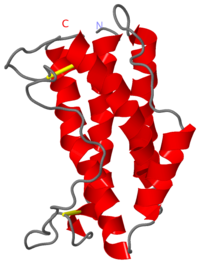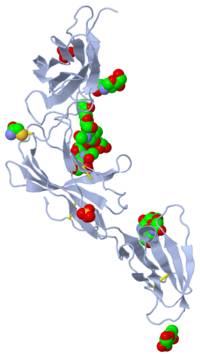From Proteopedia
proteopedia linkproteopedia link
Background
Human Interleukin-6 (IL-6) is a immune protein often categorized under hematopoietins. Since its discoverey, it has been known by many names including: interferon-ß2 (IFN-ß2), 26-kD protein, B-cell stimulatory factor-2 (BSF-2), hepatocyte stimulating factor (HSF), cytotoxic T-cell differentiation factor (CDF), interleukin-HP1 (IL-HP1), monocyte-granulocyte inducer type 2 (MGI-2), and hybridoma/plasmacytoma growth factor (HPGF/HGF). It wasn't until December of 1988 that is was givin the final moniker of IL-6 (PDB: 1IL6). Interleukin 6 (IL6) is a potent pleiotropic cytokine that regulates cell growth and differentiation and plays an important role in immune response. The protein encoded by this gene is a subunit of the receptor complex for IL6.
Structure
IL-6 is a monomer of 185 amino acids produced from T-Cells, macrophages, and endothelial cells found on a single gene at locus 7p21.
It contains five alpha-helices and four of these helices constitute a classical four-helix bundle with the fifth helix located in the CD loop.
Functions
IL-6 Receptor
Clinical Applications
Dysregulated production of IL6 and this receptor are implicated in the pathogenesis of many diseases, such as multiple myeloma, autoimmune diseases and prostate cancer. Alternatively spliced transcript variants encoding distinct isoforms have been reported.
Additional Resources
References


